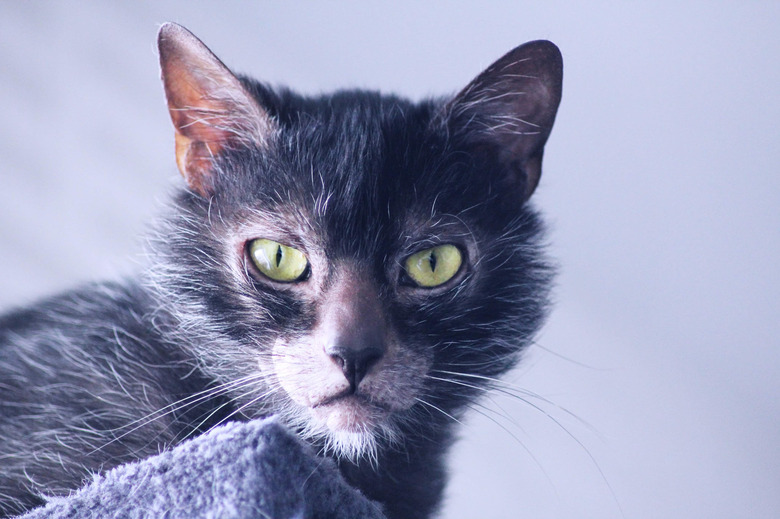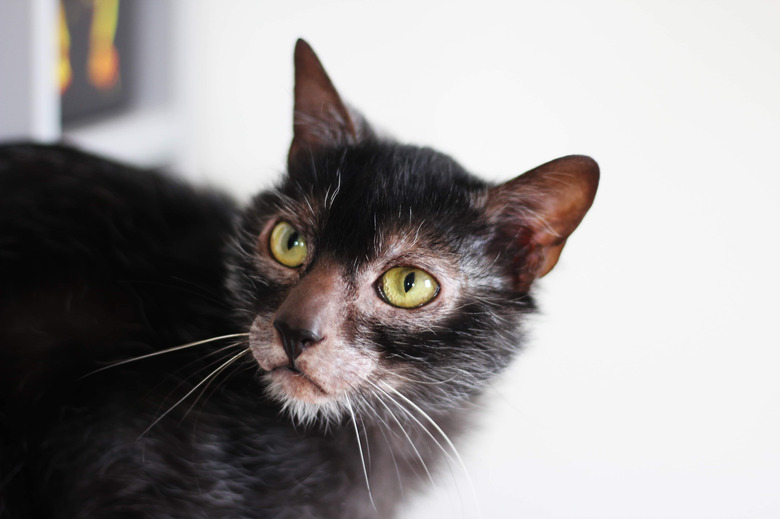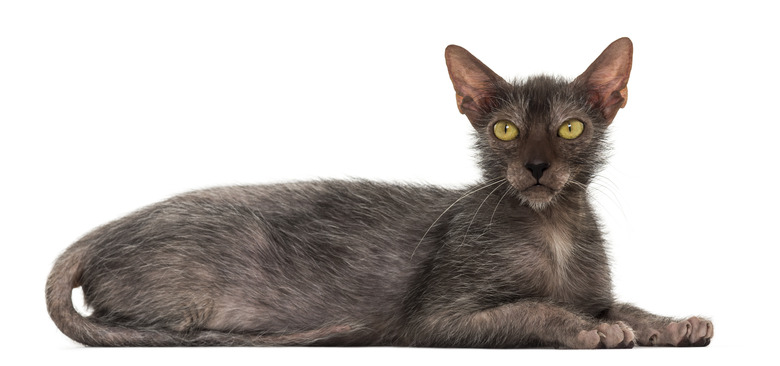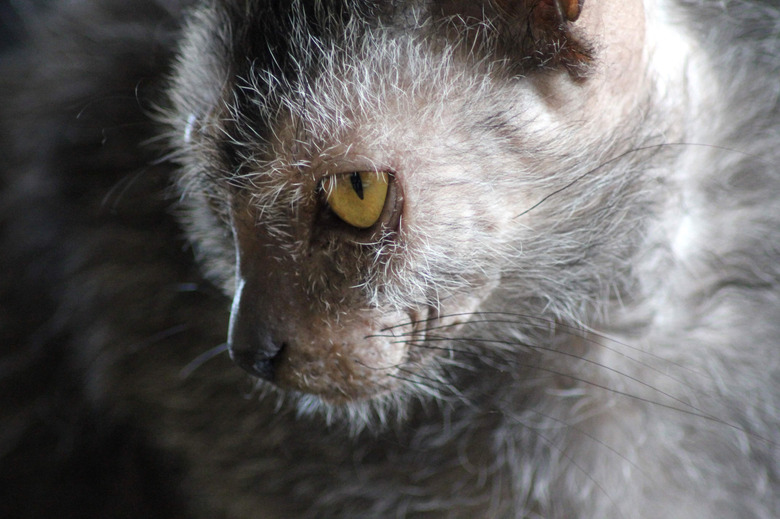Lykoi Cat Breed Characteristics
Lykoi cat quick facts
Lykoi cat quick facts
Length: 11 to 14 inches
Weight: Females: 6 – 9 pounds, males: 7 – 12 pounds
Lifespan: 12 – 15 years
Coat length: Short to medium
Coloring: Black roan is the most common, but lykoi cats come in all coat colors
Grooming needs: Medium
Friendliness: Breed alone is not an accurate predictor of individual cats' personalities. However, lykoi cats are generally regarded as friendly and outgoing.
The lykoi cat breed has a unique appearance that has given them the nickname werewolf cat. In fact, the name comes from the Greek word for wolf. They are partially hairless and have a similar hair growth pattern to an opossum. Keep in mind that although they only have a minimal amount of hair, lykoi cats are not hypoallergenic. They are friendly and intelligent cats. If you choose to bring a lykoi kitten into your home, they will soon be a fun-loving part of the family.
Lykoi cat history
Lykoi cat history
The lykoi cat breed was founded in 2011. The cats were found a year prior in Virginia in a feral cat colony and two of those cats were bred to each other to create the first lykoi. The founders of the breed are Johnny Gobble, Brittney Gobble, and Patti Thomas.
Initially, there were concerns that the cat's unusual appearance and coat were caused by disease, but genetic testing and breeding showed that the breed's unique hair coat is the result of a naturally occurring mutation. The genetic mutation that causes the wolf cat's unique appearance is caused by a recessive gene. To reduce inbreeding, breeders started breeding lykoi cats with domestic shorthair cats with black hair.
The International Cat Association's breed standard only recognizes cats with a black roan coat. However, lykois do come in all colors with a roan coat pattern. They are also the only cat breed with a roan pattern. The roan coat pattern is characterized by black, or other colored, fur with amelanistic, or lack of melanin, with white hairs interspersed throughout the entire coat.
The International Cat Association (TICA) accepted the breed for championship status in 2017. The Cat Fanciers' Association (CFA) also recognizes the breed but only allows the cats to show in the non-competitive classes.
Lykoi cat personality
Lykoi cat personality
Lykoi cats are generally friendly and loyal and will bond with your family. They are also intelligent and have a high prey drive. They are energetic and stalk their prey, which may be a toy, other pets, or your leg — before pouncing.
It can be beneficial to have multiple lykoi cats so that they can play together. Lykoi cats will also get along well with other cats and dogs in your household. Make sure they have plenty of toys available and take time each day to play with the cats to burn off their excess energy.
The cats are sometimes described as dog-like as they will joyfully play fetch. While they may snuggle in your lap for movie night, they are not lap cats. In general, lykois would much rather be playing.
Lykoi cat lifespan and health issues
Lykoi cat lifespan and health issues
As the lykoi is a fairly new breed, their exact lifespan has not been determined. Though healthy cats generally live well into their teens. The cats tend to be healthy and there are no known genetic health problems affecting the breed.
It is important to note that both the international and domestic associations allow outbreeding of domestic shorthair cats. The international association limits breeding to black domestic cats. Breeders should conduct genetic testing to ensure no cats with genetic health problems are introduced into their breeding program.
Some cats may suffer from cystic acne or develop blackheads. This can be managed with more frequent bathing but be sure to discuss any concerns with your veterinarian. It is also best to keep the cats indoors. If a lykoi cat is allowed outdoors, they are prone to sunburn due to them not having a thick coat to protect them from the sun.
Lykoi cat grooming and care
Lykoi cat grooming and care
The lykoi cat has a unique and recognizable coat. The cats are partly hairless and do not have any undercoats. They have short or medium-length guard hairs that can range from covering the entire body to just 50 percent of the body. While many cat breeds shed seasonally, the lykoi cat breed molts. After molting, the cats may be nearly hairless which can remind many cat lovers of the sphynx hairless cat breed. Though the lykoi and sphynx cat breeds are not related.
Brushing the lykoi cat's sparse guard hairs is not generally necessary. An occasional brushing can be beneficial but take care not to scratch the cat's skin. Although the hairs look rough, they are actually quite soft and don't tend to mat. You will need to regularly bathe the cat. Get the cat used to water when they are young to make this process easier. Be sure to use a shampoo designed for cats that will be gentle on their skin.
As with all cats, lykoi cats need their ears cleaned and nails trimmed regularly. Brush their teeth with veterinarian-approved toothpaste. Feed them a high-protein diet, preferably a quality commercial canned cat food, as also recommended by your veterinarian. The cats should have access to fresh drinking water at all times.
Since they don't have an undercoat and at times may be nearly hairless, the cats do not adjust well to extreme temperatures and may get cold easily. Make sure they have a warm room and cozy bed available.
Welcoming a new cat into your home
Welcoming a new cat into your home
Before you bring a lykoi kitten home, make sure you cat-proof the house. The breed tends to be quite active. Make sure you pick up anything that is unsafe for your kitten to play with. Initially, you will want to keep the cat in a single room until they are comfortable in the new environment. Set up the room with everything your new cat will need including:
- Cat food and water
- Litter box
- Cat tree and scratching post
- Toys
Allow your cat to explore on their own. Spend plenty of time in the room with your new cat, but wait for them to come to you. Don't force them to be held or petted. If you have other pets in the home, introduce them to the new cat slowly to ensure the experience is positive for both animals.
Take your time and with a bit of patience and positive reinforcement, your lykoi will soon be an active member of the family.



